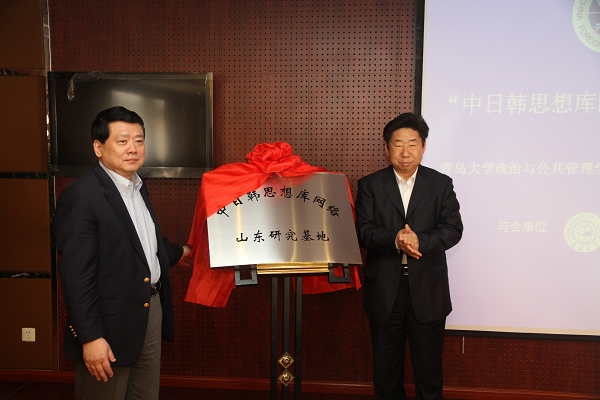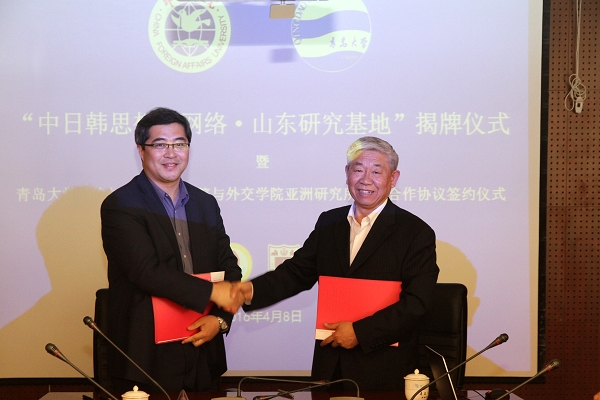
On the afternoon of April 8, the launch ceremony of the Shandong Research Base for China-Japan-Korea Think-Tank Network was held in the first Meeting Room of the University Office Building. Qin Yaqing, President of China Foreign Affairs University, and Fan Yuejin, the Party Secretary and President of Qingdao University attended the ceremony and inaugurated the research base. President assistant Qian Guoqi presided over the ceremony.
In his speech, Qin briefly introduced the background under which the China-Japan-Korea Think-Tank Network was established. He said there were some reasons why they chose Qingdao University in Shandong as the research base. First, Qingdao has a unique geographical advantage in exchanges with Japan and South Korea and has close economic and person-to-person exchanges with them. More importantly, with advantages of its disciplines and talents in the study of international relations and exchanges with Japan and South Korea, Qingdao University provides a good platform for related research. According to Qin, relying on the trilateral think-tank network, China Foreign Affairs University hopes to carry out more cooperation and exchanges with domestic institutions including Qingdao University, and build a two-track platform for trilateral dialogue between the government, business world, academic community and the media. It also hopes to carry out joint research, work for China's great diplomatic strategies, and offer suggestions for trilateral cooperation.

In his speech, Fan pointed out that the think tank is becoming an indispensable part the national governance system, and is an important embodiment of national governance capacities. In China, the trilateral think-tank network provides high-quality intellectual and ideological support for scientific decision-making of the central government. In the world, it plays a supporting role in promoting international communication and China’s public diplomacy toward Japan and South Korea. Besides, it contributes a lot to extending the influence of Chinese think-tanks. Fan says that it shows the trust and support of China Foreign Affairs University to choose our university as the base in Shandong for the trilateral think-tank network, and it is also a great event for our University in regional and national studies. It will certainly promote our research on international relations in Northeast Asia. Fan said our university has always concentrated on the issues of Northeast Asia, and become a prominent researcher on politics, economy, culture and other areas of Japan and South Korea. Our university will fully support the establishment of the research base in Shandong, and provide help for its development. We will also take this opportunity to strengthen our cooperation with China Foreign Affairs University as well as other research bases, and make contributions to the healthy and steady development of relations between China, Japan and South Korea.

Experts and scholars in the field of international relations from Jilin University, Liaoning University, Tianjin Foreign Studies University, Shandong University and other institutions attended the ceremony.
The trilateral think-tank network is established in the context when these three countries try to strengthen non-governmental exchanges and cooperation. As the only second-track think-tank network with the consensus of the three governments, it will work to strengthen the cooperation and dialogue between these three think tanks, and carry out joint research on major trilateral cooperation strategies, policy issues as well as specific areas of cooperation. It will also regularly submit research findings to the Tripartite Leaders’ Meeting, providing intellectual support for trilateral cooperation and development. In March, 2015, the seventh trilateral foreign ministers’ conference decided to promote the building of a trilateral think-tank network. China Foreign Affairs University, the Japan Forum on International Relations, and South Korea National Foreign Affairs University were designated as national coordination bodies of the trilateral think-tank network. According to the unified deployment of the Ministry of Foreign Affairs, China Foreign Affairs University fully mobilizes domestic academic resources, and promotes the domestic research base building by using its local advantages. The research base located in our university is the second one for the trilateral think-tank network research in China after the Tianjin Research Base in Tianjin Foreign Studies University. Research bases in Jiangsu, Jilin, Liaoning and other provinces will be established one after another.